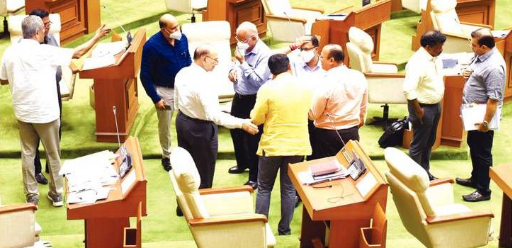
Alexandre Moniz Barbosa
In Goa, the term budgets cuts could be beginning to have a very different connotation. While universally this term signifies a reduction in the financial amount proposed for a particular department or project, the definition in Goa could well refer to cutting the number of days the Legiative Assembly sits to discuss the Budget. This refers to not just the quick passage of the Budget last week in the House, but to the manner in which over the past years the Budget has been passed by the House. To understand that better, here’s a quick recap of what all transpired with the Budgets since the current Assembly was constituted.
The Budget for 2017-18 was tabled in the House by the new government just days after having taken over the reins of the State. A day prior to presenting the Budget, the then Chief Minister Manohar Parrikar had admitted that he had limited time to draft the document and that while many things would not be found in the speech, the general policy decisions would be outlined. It was later passed.
Move to Budget 2018-2019, which was drafted by the then ailing Chief Minister Manohar Parrikar, even fine tuned from his hospital room in Mumbai, and when it was expected that it would be tabled by another senior minister, Parrikar arrived in Goa on a private airline and presented an interim Budget with the promise of all schemes and programmes being adopted and implemented in the new financial year, and a vote on account for five months taken to see the government through. The entire exercise took just about a quarter on an hour. The highlight of this brief budget speech was the Chief Minister announcing that this would be the year of employment and that education would be brought in tune with the industry employment potential. We haven’t seen this happen since then.
The next year, it was a financial statement instead of a full Budget for 2019-20, meeting an administrative necessity, but not giving the State a complete idea of the financial health. It was the second interim arrangement of the three Budgets since the current term of the Assembly had started.
The 2020-21Budget was the first full-fledged Budget of this Assembly term, a revenue surplus Budget of Rs 353.62 crore, that failed to reveal exactly where the money would come from. A month later the COVID pandemic lockdown was announced and the opposition demanded that the financial statement for the year be restructured in view of the added expenses and the derailment of the economy. Ignoring these demand the Assembly met for just one day in July 2020. The opposition walked out and the government passed the Budget for the financial year without any discussion, and transacted a record amount of business on a single day – passing the Demands for Grants without any cut motions and discussions and 11 government bills.
And now the current fiscal year. The Budget was presented in March this year and the Assembly hurriedly adjourned after passing a vote on account for five months, due to the increasing number of COVID cases and the code of conduct that came about following the announcement of elections to five municipal councils. The Assembly was to meet for a longer period in May, this was postponed to July and again ignoring opposition demands the sittings were limited to three days, during which the demands for grants were discussed and passed, but the rules of the House were suspened in regard to the passing of the Budget. This resulted in the Budget being passed without a general discussion and reply from the Chief Minister.
An interesting aspect of the three-day session is that on two days, the discussions on the demands for grants went on till late in the night – till past 4am on day two of the session – but this just does not compensate for the speed at which the Budget was passed. The Goa Assembly does need to meet more often so that issues concerning the State and the people are properly deliberated and solutions that are acceptable to all are found.
The Budget that met the approval of the House last week is the last Finance Bill of this Assembly. The next Budget will be tabled by a new government as a new Assembly has to be constituted on or before March 15, 2022. It’s been a long-established practice of the Goa Assembly to table the Budget in March, pass a vote on account for a few months and discuss it in detail during the monsoon session of the Legislative Assembly. This session is often the longest of all during the year precisely as it involves the discussions on the Budget.
For a major segment of the people, the Budget is not a financial statement of the government, but the speech through which they learn the items for which they will have to pay more and for those that they will have to pay less. The papers tabled have the finer points and the Budget speech has always been the document by which the government announces its plans for the year, especially the social welfare schemes that in the past few years have dominated the contents of the speech, the projects it will be taking up, the new taxes to be introduced or reduced and is, therefore, the most-awaited of documents that is tabled in the House. The importance of the Budget or Finance Bill cannot be underestimated, as a government can fall if it loses a vote on the finance bill. The huge majority in the House that the governemnt has at the current moment does not threaten it, so on that count there was no reason for the government to reduce the sittings of the House or pushing through the Budget with suspension of the rules.
Signs indicating that the government’s finances are under a strain have already appeared in the 2019-20 fiscal. The government’s market borrowing stood at Rs 327.83 crore, in the first quarter of the current fiscal and as on June 30, the State’s total debt has been pegged at Rs 20,085 crore. Already this fiscal, Rs 300 crore worth security stocks were auctioned to raise funds for the current FY, towards development of the State. The need for debate on this was essential, it didn’t happen.
